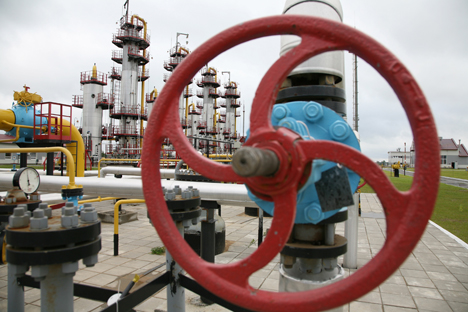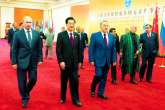Russia pushes for strengthening SCO's energy club

Russia's proposal to set up a strong and permanent mechanism for dialogue on the energy issue within the SCO is significant. Source: ITAR-TASS
In an attempt to give a greater economic role to the regional grouping, Russia is encouraging the strengthening of the ‘energy club’ within the Shanghai Cooperation Organization (SCO).
In recent years, SCO member states have sought greater energy cooperation. This follows a formulated dialogue and integrated concept for the creation of an energy club. SCO member states want to create a unified energy market for oil and gas exports, while promoting regional development through preferentialenergy agreements.
In addition to geo-political and strategic issues, energy is increasingly being identified as a vital element of security within the grouping. The idea of SCO's energy club was formulated way back in July 2007, when the grouping aimed for a common approach for strengthening energy security. It is still unclear as to how such an approach would shape up.
Russia intends to strengthen the energy club among SCO members in order to develop a joint course of action. The idea of formulating a common and strong energy policy within the SCO has been discussed at almost every summit. At the outset, the priority areas of cooperation concerning energy transportation and telecommunications were defined. The discussions also include the creation and launch of special working groups in the fuel and energy sector, as well as, for exchanging information and decisions for implementing SCO's energy security policy.
The energy club intends to unite oil and gas companies from SCO’s producers, consumers and transit countries in coordination of strategies with the aim of increasing energy security. The grouping’s observers are also expected to take an active part along with the full member states.
The SCO is still a very young organisation, having only been formed in the year 2001. The issues related to its effectiveness, particularly in the energy field, which is a comparatively recent development, might be premature. However, if efforts are put-up then it is not a difficult proposition to integrate multilateral organisations and formulate a common energy policy.
While talking about the energy club and energy security within SCO, there is a need to formulate a mechanism to defuse potentially damaging competition among producers, consumers and transit states. It is also possible for SCO members and observer states to cooperate in the field of nuclear energy. Russia and Kazakhstan have already taken the decision to form a centre for enriching uranium, much of which will come from the latter as it holds almost 20 percent of the world’s uranium reserves.
Nonetheless, SCO's two most influential members have divergent interests and views on strengthening the potential of the energy club. China seeks energy security in the sense of security of supply of energy raw materials to feed its increasing demand. However, Russia feels such a club can bring together the oil producing states to control supply and prices. Therefore, certain unsettled concerns on gas prices, tariffs and routes need to be discussed thoroughly within the SCO.
Energy traditionally holds a key position on the global agenda. Russia's proposal to set up a strong and permanent mechanism for dialogue on the energy issue within the SCO is significant. Moscow's is of the opinion that exchange of ideas could promote energy cooperation in the region and has urged for coordinated action on the issue.
Dr. Nivedita Das Kundu , Ph.D. is a foreign policy analyst from New Delhi. This is part of the Valdai Club Research Project work on SCO.
All rights reserved by Rossiyskaya Gazeta.
Subscribe
to our newsletter!
Get the week's best stories straight to your inbox
.jpg)
